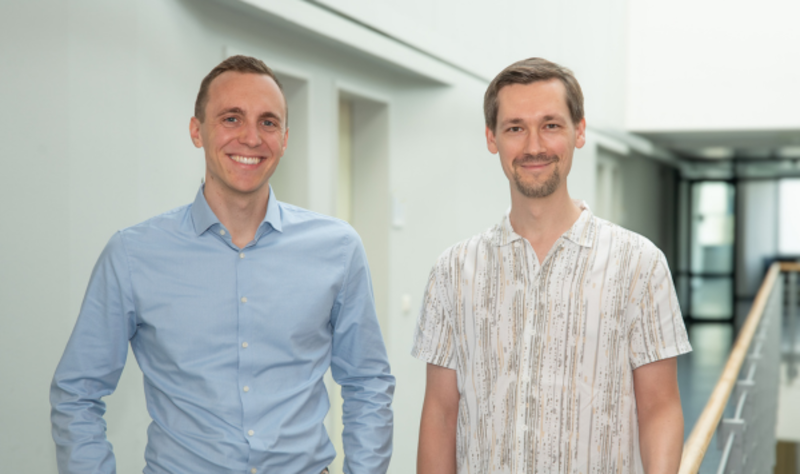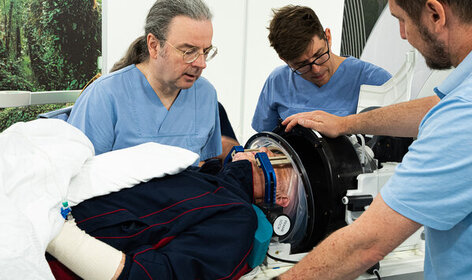New insights into human memory
Neurosciences(11.08.2025) Researchers from Freiburg and Bonn decipher how the brain follows an internal rhythm. The work has now been published in the journal "Nature Communications".
A research team from the University Medical Center Freiburg, the University Medical Center Bonn (UKB) and the University of Bonn has gained new insights into the brain processes that take place when storing and retrieving new memory content. The study is based on the measurement of individual nerve cells in people affected by epilepsy and shows how they follow an internal rhythm.

Dr. Tim Guth (left) and Prof. Lukas Kunz decipher how the brain follows an internal rhythm. University Hospital Bonn/Rolf Müller
"Similar to the members of an orchestra who orient themselves to a common beat, the activity of nerve cells is apparently linked to electrical oscillations - one to ten times per second - in the brain. The cells fire preferentially at certain times within these brain waves, a phenomenon called theta phase binding," says first author and postdoctoral researcher at the University of Bonn Dr. Tim Guth, who recently moved from the University Medical Center Freiburg to the "Cognitive and Translational Neuroscience" research group at the UKB.
The research team led by Tim Guth and Lukas Kunz discovered that the interplay of nerve cells and brain waves is active in both memorizing and remembering new information - specifically in the medial temporal lobe, a central area for human memory. In the study on spatial memory, however, the strength of the theta phase binding of the nerve cells during memory formation was independent of whether the test subjects were later able to remember the memory content correctly or not. "This suggests that although theta phase binding is a general phenomenon of the human memory system, it is not the sole determinant of successful recall," says corresponding author Prof. Dr. Lukas Kunz, head of the "Cognitive and Translational Neuroscience" research group at the Department of Epileptology at the UKB and member of the Transdisciplinary Research Area (TRA) "Life & Health" at the University of Bonn.
Interaction of nerve cells and electrical signals
While most nerve cells always fired at the same oscillation time, some nerve cells excitingly changed their preferred timing between learning and remembering. "This supports the theory that our brain can separate learning and retrieval processes within a brainwave, similar to members of an orchestra playing at different time signatures in a piece of music," says Guth. The study provides new clues as to how nerve cells and electrical signals interact in the brain while new memories are being formed. Prof. Kunz draws the following conclusion: "A better understanding of these processes could help to better understand memory disorders in the long term and treat them in a more targeted manner."
The researchers used measurements carried out in Freiburg
The research team was able to observe the interaction of nerve cells and brain waves during the memory process as part of the study by using a special feature of epilepsy therapy. People with epilepsy that is particularly difficult to treat are implanted with electrodes in the brain for diagnostic purposes. The aim is to precisely determine the origin of the epileptic seizures in order to achieve better surgical results. However, these implanted electrodes can also be used to record the human brain activity of individual cells. The researchers used measurements taken at the University Medical Center Freiburg and would like to thank all those affected who took part in this study.
Participating institutions and funding:
In addition to the University Medical Center Bonn (UKB), the University of Bonn and the University Medical Center Freiburg, Columbia University (New York, USA) was involved. The research work was funded by the German Federal Ministry of Research, Technology and Space (BMFTR), the US National Institutes of Health (NIH), the US National Science Foundation (NSF), the German Research Foundation (DFG) and the return program of the Ministry of Culture and Science of the State of North Rhine-Westphalia.
Publication: Guth et al.: Theta-phase locking of single neurons during human spatial memory; Nature Communications; DOI: 10.1038/s41467-025-62553-9
More interesting articles
University Medical Center Freiburg
Central InformationPhone: 0761 270-0
info@uniklinik-freiburg.de
Corporate Communications
Breisacher Straße 15379110 Freiburg
Phone: 0761 270-84830
kommunikation@uniklinik-freiburg.de



